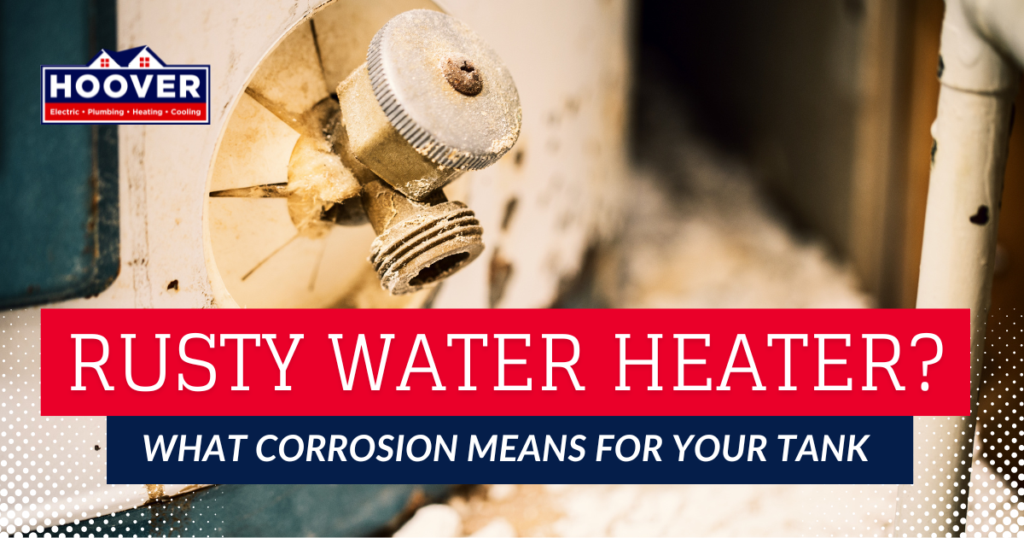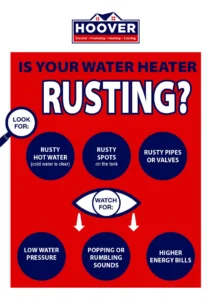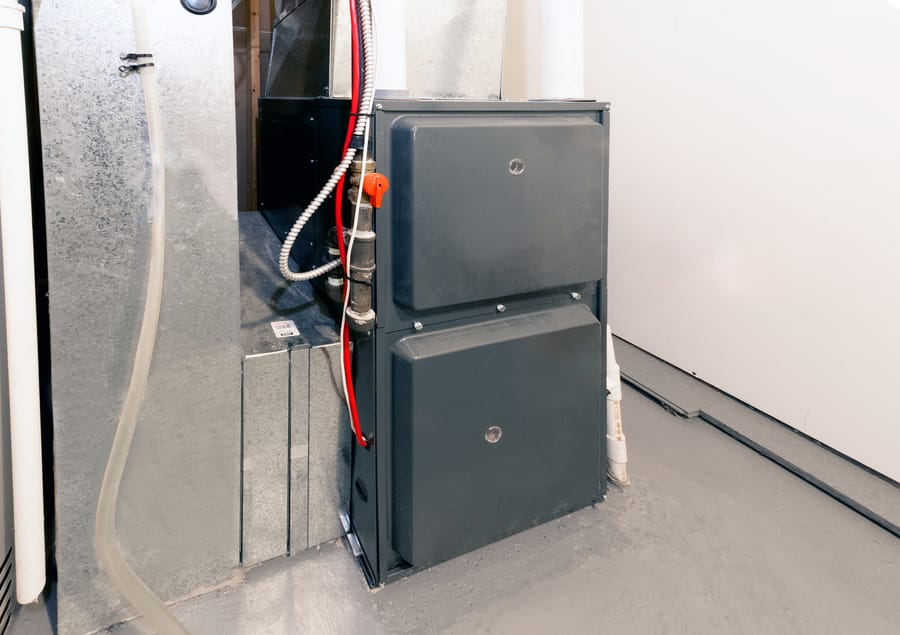Proudly Serving Southeast Michigan
Rusty Water Heater? What Corrosion Means for Your Tank

Have you noticed rust-colored water coming from your hot water taps? Or perhaps strange discoloration around your home’s water heater? A rusty water heater is a common household problem you can’t ignore. Water heater corrosion affects water quality and can lead to serious damage, leaks, and even complete system failure.
At Hoover Electric, Plumbing, Heating & Cooling, we’ve helped many Michigan homeowners address their hot water heater rust problems. Learn to recognize the signs of a corroded water heater, and call us for preventative maintenance and repair today.
Understanding Water Heater Rust and Corrosion
Water heater corrosion occurs through a natural chemical process, but understanding why it happens can help you prevent premature failure of your hot water tank.
Why does a water heater rust?
Even well-maintained systems eventually develop hot water heater rust inside the tank. Most water heaters contain steel tanks with glass linings. Over time, microscopic cracks in the glass expose the steel to water, creating conditions for rust to form.
When metal components contact water and oxygen, a chemical reaction creates iron oxide, otherwise known as rust. Water temperature and acidity levels can accelerate this process. Inside your hot water tank, sediment buildup and hard water with a high mineral content can further speed up the process.
Is rust in your water heater dangerous?
Water heater rust problems go beyond aesthetics. A rusty water heater can discolor your water, leaving reddish-brown stains on fixtures and clothing. While small amounts of rust may not be harmful or affect taste, heavy hot water heater rust can make water unpleasant. Excess iron can affect taste and may exacerbate certain health conditions.
Water heater corrosion can also undermine the structural integrity of your hot water tank. Rust particles can clog faucet aerators, damage appliance valves, and contribute to blockages throughout your home’s plumbing system.
Signs Your Water Heater Is Rusting
When you know how to recognize signs of a corroded water heater, you can save yourself from costly repairs that may arise if water heater rust problems are left unaddressed.
Visual clues of rust and corrosion
You may notice rust-colored water coming from hot water taps while cold water runs clear. This indicates that the problem concerns your water heater rather than your municipal water supply.
Another telltale sign of a corroded water heater is the development of discolored or rusty spots around the tank’s exterior. This typically indicates rust spreading from within or moisture issues around the unit. You may also see rust buildup around fittings, valves, or pipes, suggesting leaks or condensation that will worsen over time.
Performance issues related to rust
Along with visual indicators, your water heater may also exhibit operational problems indicative of a rusty water heater. Rust flaking off interior surfaces combines with mineral deposits, restricting water flow and reducing pressure. Your water heater may start to make popping or rumbling noises caused by steam bubbles at the bottom of the tank.
An inefficient system often leads to higher-than-expected energy bills. Rust and sediment form an insulating layer between the burner and the water, forcing your system to work harder to heat the same amount.
Causes of Water Heater Corrosion
Several factors can lead to water heater corrosion. Understanding these common causes allows you to take preventative steps to extend your system’s usable lifespan.
Internal factors that lead to rust
The buildup of water heater rust inside the tank can arise from the environment inside your water heater tank.
- Failing or depleted anode rod
- Hard water and mineral buildup
- High water temperatures that accelerate oxidation
External factors that contribute to corrosion
Factors outside of the tank can also lead to water heater rust problems:
- Leaky pipes or fittings create constant moisture that promotes corrosion
- Exposure to high humidity in the utility area increases the risk of rust formation
- Poor ventilation around the water heater also traps moisture around your tank
How To Fix a Rusty Water Heater
When you discover a rusty water heater, you have several options, depending on the severity of the water heater’s corrosion.
Can you remove rust from a water heater?
If you catch the signs of a corroded water heater early enough, certain maintenance steps can effectively combat minor water heater rust problems.
- Flushing the tank to remove sediment
- Replacing the anode rod to slow corrosion
- Treating water with a softener to reduce minerals
When to replace vs. repair a corroded water heater
If the rust in your hot water heater reaches an irreversible stage, consider replacing the entire hot water tank. We offer free estimates. Ask yourself a few questions when deciding between water heater repair and replacement:
- How extensive is the rust damage? Surface rust may be repairable, but significant water heater rust inside the tank usually requires replacement.
- How old is your water heater? Most water heaters can last up to 10–12 years with proper maintenance.
- How do the costs compare? If your water heater requires two or more major repairs, investing in a new unit with Hoover’s financing options is often more cost-effective.
How To Prevent Water Heater Rust in the Future
Preventing water heater corrosion saves money and extends your unit’s service life.
Regular maintenance tips
A consistent maintenance schedule is your best defense against water heater rust problems. Flush the tank once a year to remove sediment, inspect your anode rod every two to three years, replace it when it’s significantly corroded, and ask a pro to perform regular visual inspections of pipes and valves for leaks.
Choosing a rust-resistant water heater
When it’s time for a new water heater, higher-quality tanks with stainless steel or glass-lined tanks better resist rust formation. Tankless water heaters eliminate standing water that causes tank corrosion, though they have different maintenance requirements. Consider models with built-in scale prevention technology or larger anode rods for areas with particularly hard water.
Fix Your Rusty Water Heater with Hoover Electric, Plumbing, Heating & Cooling
A rusty water heater indicates that corrosion is actively damaging your system. While some water heater corrosion is normal, excessive rust significantly shortens the unit’s lifespan. Regular preventative maintenance from experienced professionals can prevent many of these hot water rust problems.
Contact us to schedule service today at (586) 800-4708. Our team can help determine whether repair or replacement is your best option. We promise honest, affordable solutions backed by over 40 years of experience serving Southeast Michigan.
Frequently Asked Questions
How long does it take for a water heater to corrode?
Water heaters typically show signs of rust after 5–7 years, though this varies based on water quality, maintenance, and unit quality.
Why is my water heater rusting when it’s only a few years old?
Premature rusting may indicate poor water quality, a defective anode rod, or installation issues. The local plumbers at Hoover can inspect your system to identify the cause.
Is it normal for a water heater to rust over time?
Yes, some corrosion is normal over a water heater’s lifespan. Proper maintenance can help prevent excessive rust for about 10 years in most residential units.
When You Want It Done Right
Call Hoover!
Our electrical, plumbing, heating, & cooling professionals offer all the services you need under one roof.



